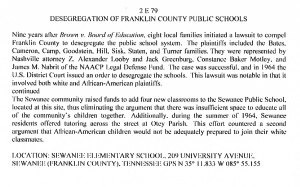The Depot Project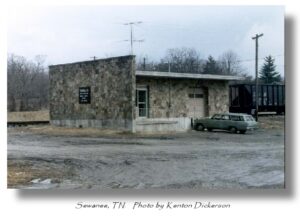
The Sewanee Civic Association is partnering with the Mountain Goat Trail Alliance, the University of the South, and the Sewanee Business Alliance to facilitate the relocation of the Mountain Goat Trailhead in Sewanee, Hawkins Lane, to the old freight depot area, 17 Lake O’Donnell Road.
The first depot building was constructed in 1860. Both the freight and passenger depots stood on the north side of the railroad tracks, which is now the middle of Highway 41A. This building was constructed when both the passenger and freight depots were razed for the bypass around the University in the 1960s. This depot, which was placed on the south side of the railroad tracks, opened in 1964. It currently stands on the southeast corner of US Highway 41A and University Avenue. By the 1970s, the depot was under-used. Since it was no longer being used for railroad purposes, the building reverted to the University. The railroad, which at its height ran 3-4 trains a day with both coal and passenger cars, stopped running freight trains in 1984 and this branch line was officially abandoned on May 1, 1985. In 1986 the tracks were removed, leaving the stone building as a depot without a rail line. The Mountain Goat Trail would be developed later where the tracks had been.
In May 2023, the Sewanee Civic Association entered an MOU with the University to utilize the exterior premises of the old Hair Depot building, 17 Lake O’Donnell Road, as the MGT trailhead and information center.
In June 2023, the Sewanee Civic Association and the Sewanee Community Chest received a grant from the South Cumberland Community Fund to improve the landscape, parking, and put communal elements on the exterior of the building.
Additional planning efforts will investigate interior development of public restrooms, exhibit and retail space, and further development of the site as a passive-use park. Interior uses might include sharing community history, orienting visitors to local attractions, businesses, and recreational opportunities, and selling items such as Sewanee- and University of the South-branded items, gifts, local art, trail supplies, etc. The building and surrounding grounds could be used to host community events and act as a small passive-use park.
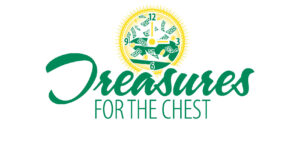
Nonfood, and School Supply Drives
The Sewanee Civic Association is inviting individuals, local groups and businesses to help collect donations of nonfood items for the Community Action Committee (CAC). This collection will augment the services provided by the CAC food pantry. Supplemental Nutrition Assistance Program benefits cannot be used to purchase any nonfood items, which includes pet food; cleaning supplies; paper products; household supplies; detergent; menstrual products; diapers; or other personal care items.
Monetary donations are made at local businesses. An Amazon Wish List is available to order items that are delivered to the CAC. There are two nonfood supply drives, one in September and then in March.
The CAC oversees the distribution of the donations to those in need. The CAC is an outreach ministry of the Parish of St. Mark and St. Paul, with generous support from the Sewanee Community Chest and individuals across the Mountain. For more than 48 years, the CAC has provided food, financial assistance, and educational support for persons in the greater Sewanee community.
The event is sponsored by the Community Action Committee, the Office of Civic Engagement, the Sewanee Civic Association, and the Sewanee Community Chest.
In July, the Sewanee Civic Association oversees a School Supply Drive to benefit the students at Sewanee Elementary. Donations are accepted at the school, and monetary gifts are made at local businesses. An Amazon Wish List is also available. Sewanee Elementary School will give the donations to those students who are in need of supplies. The event is sponsored by the Sewanee Elementary School, the Sewanee Civic Association, and the Sewanee Community Chest.
These are part of the Sewanee Civic Association Treasures for the Chest initiative, a campaign to help promote community-wide service of giving time, support and donations. Volunteers are needed. To volunteer contact us.
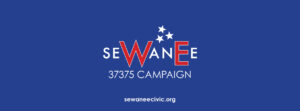 The 37375 CAMPAIGN
The 37375 CAMPAIGN
The Sewanee Business Alliance (SBA) and the Sewanee Civic Association (SCA) worked together on a new fundraising campaign to raise funds for the purchase and distribution of health and safety products and services. These goods and services were distributed to Sewanee’s nonprofit organizations, SBA members, senior citizens organizations, churches, and all the local daycare centers and PreK-12 schools on the Domain and its outskirts. A total of $28,000 was raised.
From the funds raised, a small panel of health experts advised us as we purchased the following types of items and improvements:- Sanitizing products and equipment (hand sanitizer, liquid soap, touchless dispensers, disinfectant wipes, public hand washing stations, UV lights, etc.); Communications materials (attractive signage, uniformity in messaging, information packets for leaders of businesses and nonprofits, etc.); Structural retrofits (plexiglass purchase and installation, improved indoor ventilation, outdoor dining solutions, etc.); Operational improvements (no contact payment systems, deep cleaning of a building, creating one-way customer traffic flows within stores, markings for floors, etc.); and, Personal protective equipment and devices (masks, gloves, digital forehead thermometers, etc.).
Once the funds were collected, eligible community organizations submitted a simple application asking for assistance and choosing from the above, giving this program the flexibility it needed to meet the needs of a variety of organizations. To distribute the funds, a separate small panel made up of community, SBA and SCA members reviewed the proposals and disbursed tangible products or dispatched a person to solve that particular problem.
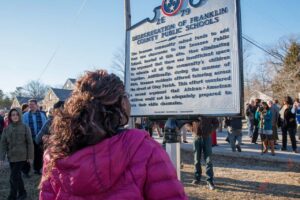 Historical Marker
Historical Marker
The Sewanee Civic Association is undertaking the celebration of the 50th anniversary of the desegregation of the Sewanee Public School, now Sewanee Elementary School. Sewanee Public School was the first public school in Franklin County to integrate, which took place in 1964 as a result of a combined effort of eight Sewanee families to bring equality to our school system.
The State of Tennessee offers precise guidelines as to text layout and language and all marker content must be approved by the State Historical Commission before production is begun. The goal is to have the historical marker approved, produced, and in place by MLK Day. Further celebrations are planned to honor the 50th anniversary.
Update on Historical Marker
The Tennessee Historic Commission has approved the historical marker commemorating the desegregation of Sewanee Public School, now Sewanee Elementary School.
The two-sided marker should be in place at the end of January, 2014.
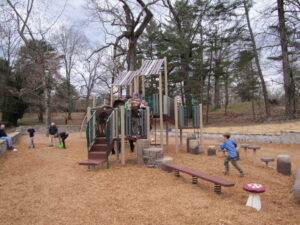 Parks
Parks
The Sewanee Civic Association (SCA) is overseeing the rebuilding/reinventing of playgrounds on the Domain. These are Elliott Park, the Sewanee Community Center, Woodlands, St. Mark’s Center, and the Ball Park. All are in current state of disrepair. The SCA is currently working on improving Elliott Park. This will be a collaborative community effort.
The goal of the Sewanee Civic Association is to help improve municipal conditions and equipment, and raise money the town cannot raise in taxes because it is unincorporated.
Parks have always been a community led initiative. In fact, the SCA through community funding, built one of the first parks in Sewanee, Shoup Park. In recent years, from the playground at the Sewanee Community Center to the fields and playground at the Ball Park, community members saw a need, secured funding, built the parks and play structures, and maintained them.
In 2012, the University removed the pirate ship, the cabin, the automobile, and the picnic table at Elliott Park. Emily Puckette then began discussions with the University about playgrounds. The SCA stepped in, creating a Parks Committee.
In one of the first steps to have an adequate park system in Sewanee, the SCA entered into a memorandum of understanding with the University of the South and Friends of the Dog Park for the Phil White Dog Park. The Friends of the Dog Park is a group of volunteers who wanted to have a safe place for dogs to play. A main concern was this group was not duly organized. This park is funded and maintained by the community through the Friends of the Dog Park Committee.
The Parks Committee then conducted a community wide survey in September 2013 to gather community input about plans to construct a community park and playground. Approximately 150 community members responded. Of the five proposed sites—Elliott Park, the Sewanee Community Center, Woodlands, the Ball Park, and St. Mark’s Center—two-thirds of those responding named Elliott Park as their first choice to be revitalized.
The Parks Committee analyzed the survey data, determined the location and footprint of the proposed park, and then submitted Requests for Information to possible vendors. RFIs were sent to nine playground companies. RFPs (request for proposal) were then sent to four finalists, which, in turn, sent detailed proposals. The Parks Committee rejected those, and has now settled on a fifth company, Game Time. This company is reputable and has built many playgrounds in the region.
All parks must be Americans with Disabilities Act (ADA) compliant. Half of the play components need to accommodate disabled children, and walkways and ground surfaces need to be wheelchair accessible. From the survey results, the most frequently suggested equipment for a park was a climbing structure, swings, and a slide.
There must be a system in place where there is accountability to maintain the parks. It is imperative that parks in Sewanee be safe and sustainable places to play for years to come.
At the April 15, 2015, the active SCA membership present approved the plans for Elliott Park. Construction is expected to begin in September 2015.
FOR THE PARKS CAMPAIGN
We have a vision to reinvent Elliott Park and we need your help.
A central playground and meeting place for families in the community, this park is located on the east side of University Avenue: in the small hollow below the Book and Supply Store and near the center of the University campus.
Originally designated in 1870, Elliott Park has a history of community support with much of its playground equipment built by the community or purchased with donations. A swing set, chin up bars, wooden step structure, and sand box (now removed) were installed under the leadership of Sandy Baird and Yolande Gottfried in the 1980s. In 1998, community member Dana Lesesne spearheaded the addition of a pirate ship constructed by the Sewanee chapter of Phi Gamma Delta (Fiji), with support from various sources including the Kaj Krogstad Memorial Fund. In 2012, when several wooden play elements were in disrepair, the University removed the ship, cabin, play automobile, and picnic table from Elliott Park leaving behind little more than an aging swing set in what was once a vibrant place for the children to play.
We are beginning the next chapter of this community-supported park. The Sewanee Civic Association board has drafted an action plan to raise $65,000 for the Elliott Park playground equipment and installation. The plan includes soliciting a combination of individual, corporate, and foundation gifts during the next few months through the Sewanee Community Chest, a 501(c) 3 organization. We have a verbal agreement with the University for site preparation and are drafting a written Memorandum of Understanding that includes maintenance of the park and contingency planning for the equipment should the University ever need to relocate it. There will be community build events where volunteers can participate in the installation of the playground equipment. This will be a collaborative effort with the University’s Physical Plant Services, neighboring organizations, and community volunteers to maintain and enhance the park, creating a sense of ownership to ensure the long-term care and upkeep of this important part of the community.
Children need a place to play and people need a place to gather. The For the Parks project will benefit the whole community and our many visitors by reminding us that Sewanee is not only a place where families live, but is a place where families are valued. We hope you will join the community effort to reinvent this community park.
This unique special-project for the parks capital campaign was completed in September 2015.

